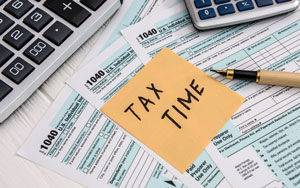 The coronavirus’s effect on the economy has shaken the world, especially those in the retail space. Decreased foot traffic, shuttered stores, and massive changes in consumer trends have caused retailers to change tactics at the drop of a hat just to stay afloat.
The coronavirus’s effect on the economy has shaken the world, especially those in the retail space. Decreased foot traffic, shuttered stores, and massive changes in consumer trends have caused retailers to change tactics at the drop of a hat just to stay afloat.
It’s this scramble to adjust that has caused the federal government to push this year’s tax filing deadline from April to July 15th. This relief program allows individuals and businesses an extra three months to file and pay their annual taxes. And it’s being utilized: the IRS has received 6.3 million fewer returns than normal so far. However, the July 15th date is quickly approaching, so it’s critical that you’re prepared to file for your retail business soon, if you haven’t already.
If the thought of filing for taxes in the midst of the pandemic intimidates you, we’ve compiled additional information and tips to help ensure you file accurately and efficiently in the next few weeks.
It Could Cause a Second Stimulus
Economic experts believe that many of the businesses filing in July are due a refund. In fact, some estimate there are 18 million more refunds to be had. This extra money in taxpayers’ wallets will not only allow you to put more money into your business, but it will also likely cause a second stimulus, encouraging customers to begin shopping again.
Late Payments Will Create Interest
The IRS has stated that any unpaid taxes will begin to accrue interest and penalties starting July 16th. And, because the retail industry pays some of the highest tax rates, this could start to add up. To avoid additional fees, be sure to get your filing completed before midnight on the 15th.
You Can Extend the Deadline if Needed
If for whatever reason you are unable to make the July 15th deadline, you can request an additional extension from the IRS. To do so, you must file form 7004 through your tax professional/software or through the IRS site yourself. For more information on the new tax deadline, visit the IRS’s 2020 Tax Extension page.
How to File
Are you confused about how to go about filing, or simply how to organize your finances and documents? Here are some tips:
Hire help
Although you can certainly do your own business taxes with online software, the amount of money and documents associated with retail work can make things very complicated. Working with a seasoned tax professional will make things go much smoother and save you time so you can ensure your store is set up for success both during and after the crisis.
If you choose to do your taxes on your own, you can use the Wall Street Journal’s tax guide for the retail industry. It offers insights into what requirements those in the industry need for their taxes and provides information on how the retail industry can benefit and lose from taxes.
Organize Your Documents
Before sitting down to file, you should gather all the necessary documents for easy reference, either for yourself or your accountant. Not sure what kind of paperwork you’ll need handy when filing? The most important item is a list of all your transactions and expenditures throughout the year. If you use software like Quickbooks, you can easily pull this data for quick reference. Then, separate your expenses into categories like payroll, utilities, inventory purchases, etc. so you can more clearly understand the money you brought in and the money you spent.
Look Toward Next Year
Once you file your taxes this year, it’s critical to start planning for next year’s. Although it might seem too soon, it’s important that you stay organized all year long to make tax season seamless. Regularly utilize spreadsheets to track all your spending and revenue for easy reference next April.
Additionally, reflect on whether or not your business structure is the correct one for you. Has your store grown from a sole proprietorship to an LLC or partnership? These titles matter when trying to file your taxes accurately, so be sure you’re aware of the differences. Not sure which one applies to you? You can learn more about the different business structures in this guide for new businesses, though the information is just as relevant to existing retail organizations. If you need more guidance, your tax professional should be able to steer you in the right direction.
Filing in July
Although this tax season is looking very different than most, it still holds the same requirements. Always reach out to tax professionals for help if you need it, be sure to stay organized and accurate, and remain educated on the latest IRS news. Lastly, be sure to constantly prepare for next year’s tax season so you don’t have to pull your focus away from your business every April.